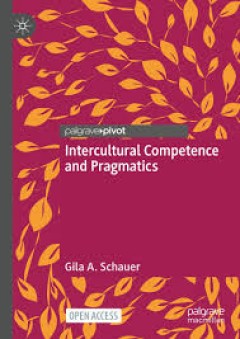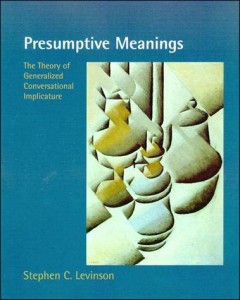Filter by

(In)Appropriate Online Behavior: A pragmatic analysis of message board relations
This descriptive and comprehensive study on the discursive struggle over interpersonal relations in online message boards is located at the fascinating interface of pragmatics and computer-mediated discourse – a research area which has so far not attracted much scientific interest. It sets out to shed light on the question how interpersonal relations are established, managed and negotiated in…
- Edition
- -
- ISBN/ISSN
- 9789027272379
- Collation
- -
- Series Title
- -
- Call Number
- -

“Self” in Language, Culture, and Cognition
This book explores socio-cultural meanings of ‘self’ in the Chinese language through analysing a range of conversations among Chinese immigrants to Australia qualitatively on the topics of individuality, social relationships and collective identity. If language, culture and cognition are major roads, this book is the junction that unites them by arguing that selfhood occurs at their interfa…
- Edition
- -
- ISBN/ISSN
- 9789027204691
- Collation
- -
- Series Title
- -
- Call Number
- -

Intercultural Competence and Pragmatics
While international organizations such as the United Nations Educational, Scientific and Cultural Organization (UNESCO) or the Council of Europe (CoE) agree that intercultural competence should play an important role in education, it is not always clear what IC may encompass in specific teaching contexts and subject areas. Examining how modern foreign language teachers in higher education conce…
- Edition
- -
- ISBN/ISSN
- 978-3-031-44472-2
- Collation
- XXIV, 154
- Series Title
- -
- Call Number
- -

Language and Equilibrium
In this work, Prashant Parikh offers a new account of meaning for natural language. He argues that equilibrium, or balance among multiple interacting forces, is a key attribute of language and meaning and shows how to derive the meaning of an utterance from first principles by modelling it as a system of interdependent games.OCLC-licensed vendor bibliographic record.
- Edition
- -
- ISBN/ISSN
- 9780262281263
- Collation
- 1 online resource (xii, 344 pages) :illustrations
- Series Title
- -
- Call Number
- -

Intentions in communication
"A Bradford book."Intentions in Communication brings together major theorists from artificial intelligence and computer science, linguistics, philosophy, and psychology whose work develops the foundations for an account of the role of intentions in a comprehensive theory of communication. It demonstrates, for the first time, the emerging cooperation among disciplines concerned with the fundamen…
- Edition
- -
- ISBN/ISSN
- 0585363692
- Collation
- 1 online resource (x, 508 pages) : illustrations.
- Series Title
- -
- Call Number
- 005 INT

Presumptive meanings :the theory of generalized conversational implicature
This is the first extended discussion of preferred interpretation in language understanding, integrating much of the best research in linguistic pragmatics from the last two decades. When we speak, we mean more than we say. In this book Stephen C. Levinson explains some general processes that underlie presumptions in communication. This is the first extended discussion of preferred interpret…
- Edition
- -
- ISBN/ISSN
- 9780262278256
- Collation
- 1 online resource (xxiii, 480 pages).
- Series Title
- -
- Call Number
- -

What Counts: Focus and Quantification
In What Counts, Elena Herburger considers the effects of focus on interpretation. She investigates how focus affects the pragmatics and truth conditions of a sentence by rearranging its quantificational structure.Adopting a neo-Davidsonian stance, Herburger claims that various pragmatic and truth-conditional effects of focus sustain a uniform explanation if focus is viewed as imposing structure…
- Edition
- -
- ISBN/ISSN
- 9780262275293
- Collation
- 1 online resource (x, 166 pages).
- Series Title
- -
- Call Number
- -

Getting Through: The Pleasures and Perils of Cross-Cultural Communication
Understanding how culture affects the ways we communicate -- how we tell jokes, greet, ask questions, hedge, apologize, compliment, and so much more. We can learn to speak other languages, but do we truly understand what we are saying? How much detail should we offer when someone asks how we are? How close should we stand to our conversational partners? Is an invitation genuine or just pro form…
- Edition
- -
- ISBN/ISSN
- 9780262340601
- Collation
- 1 online resource (xx, 276 pages) :illustrations
- Series Title
- -
- Call Number
- -

Words without meaning
"A Bradford book."According to the received view of linguistic communication, the primary function of language is to enable speakers to reveal the propositional contents of their thoughts to hearers. Speakers are able to do this because they share with their hearers an understanding of the meanings of words. Christopher Gauker rejects this conception of language, arguing that it rests on an unt…
- Edition
- -
- ISBN/ISSN
- 9780262273596
- Collation
- 1 online resource (xi, 299 pages).
- Series Title
- -
- Call Number
- -

Language and Belonging Local Categories and Practices in a Guatemalan Highla…
In this book, the author introduces belonging from a sociolinguistic perspective as a concept that is accomplished in interaction. Belonging can be expressed linguistically in social, spatial and temporal categories – indexing rootedness, groupness and cohesion. It can also be captured through shared linguistic practices within a group, e.g. collectively shared narrative practices. Using conv…
- Edition
- -
- ISBN/ISSN
- 9783631768921
- Collation
- -
- Series Title
- -
- Call Number
- -
 Computer Science, Information & General Works
Computer Science, Information & General Works  Philosophy & Psychology
Philosophy & Psychology  Religion
Religion  Social Sciences
Social Sciences  Language
Language  Pure Science
Pure Science  Applied Sciences
Applied Sciences  Art & Recreation
Art & Recreation  Literature
Literature  History & Geography
History & Geography